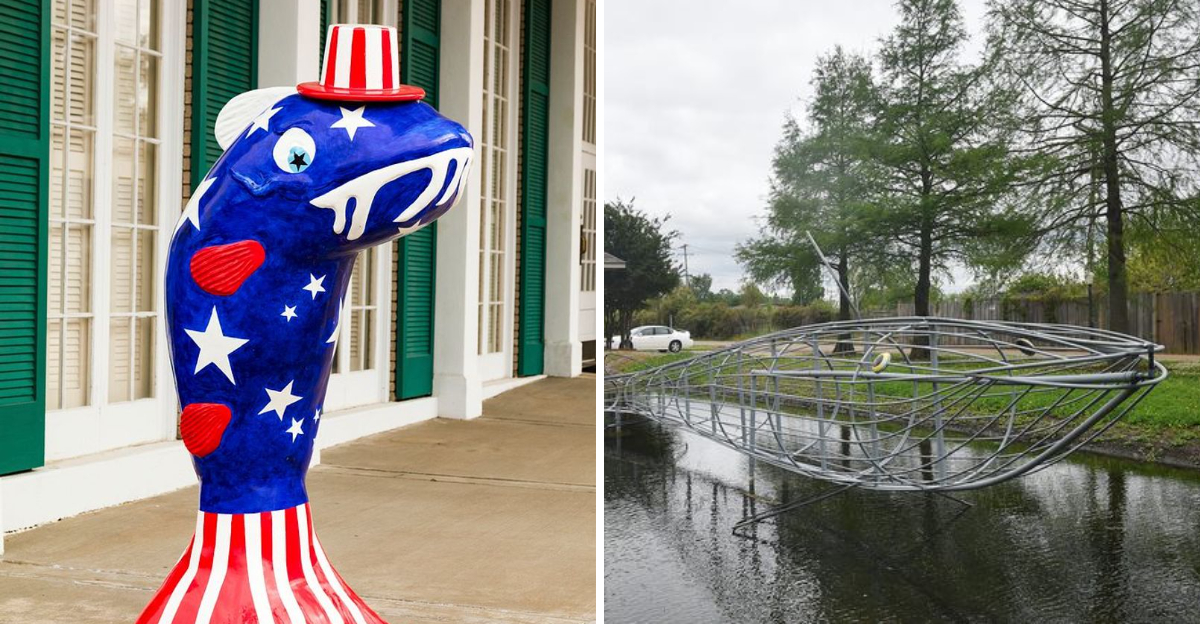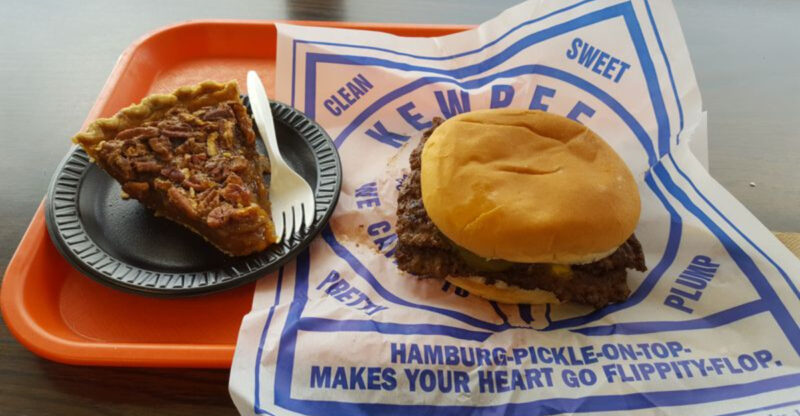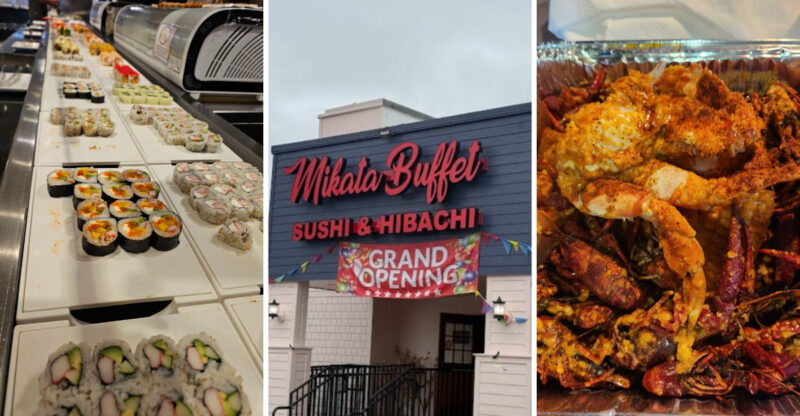The Real Catfish Capital Of Mississippi Will Shock You

When you think of catfish, your mind probably wanders to any random fish fry spot in the South. But let me tell you something that’ll blow your mind: Belzoni, Mississippi, isn’t just playing around with the title of Catfish Capital, it earned it, owns it, and lives it every single day.
This tiny Delta town produces more farm-raised catfish than anywhere else in the entire country, and honestly, the numbers are wild.
Humphreys County Catfish Pond Empire
Where else can you find 40,000 acres of catfish ponds stretching across the landscape like some aquatic checkerboard? Humphreys County didn’t stumble into this title by accident.
This place produces more farm-raised catfish than any other county in America, period. The ponds shimmer under the Mississippi sun, each one teeming with thousands of whiskered swimmers just waiting to become your next meal.
It’s an empire built on muddy water and pure determination. Farmers here know catfish like musicians know rhythm, and they’ve perfected the art over decades of trial, error, and stubborn Delta grit.
The 65-Mile Catfish Radius
Did you know that 60% of all U.S. farm-raised catfish come from within a 65-mile radius of Belzoni? That’s not a fun little factoid, that’s dominance. This isn’t just a town that farms catfish; it’s the epicenter of an entire industry that feeds the nation.
Think about that next time you order catfish at a restaurant in Chicago or New York. Chances are ridiculously high that fish swam in a Belzoni-area pond before it landed on your plate.
The concentration of catfish farming here is so intense, you could call it the Silicon Valley of fish, except way tastier and infinitely more Southern.
Governor-Approved Catfish Royalty
Back in the 1970s, when the catfish industry exploded like fireworks on the Fourth of July, Governor Cliff Finch made it official. Belzoni became the Farm-Raised Catfish Capital of the World, stamped and certified by the state itself.
This wasn’t some tourism board gimmick, it was recognition of real economic power. The designation came during a time when Belzoni was transforming from a quiet Delta town into an aquaculture powerhouse.
Farmers switched from cotton to catfish, and suddenly everyone wanted a piece of this underwater gold rush. That official title still holds today, decades later, because Belzoni never stopped swimming.
World Catfish Festival
Every April, Belzoni throws the party of the year, and trust me, it’s all about the fish. The World Catfish Festival draws thousands of visitors who come for live music, local crafts, and mountains of golden fried catfish that could make a vegetarian weep with temptation.
This isn’t your average small-town fair. It’s a full-blown celebration of everything catfish, where locals and tourists alike gather to honor the fish that built this town.
You’ll find catfish prepared every way imaginable, from classic fried fillets to creative new dishes that push the boundaries of Southern cooking. It’s messy, loud, delicious, and absolutely unforgettable.
Economic Backbone Of The Delta
When the catfish industry hit its peak, it wasn’t just about fish, it was about survival for an entire region. Thousands of jobs sprouted up around catfish farming, processing, and distribution, breathing economic life into a part of Mississippi that desperately needed it.
Belzoni became a place where families could build futures, where young people didn’t have to leave to find work. The industry supported entire communities, from the farmers tending ponds to the processors working long shifts to get fish to market.
Though the industry has faced challenges, that legacy of economic impact still shapes Belzoni today, reminding everyone what hard work and innovation can achieve.
Fried Catfish Culinary Kingdom
How do you truly understand Belzoni without tasting its catfish? Local restaurants serve up fried catfish platters that define Southern comfort food, crispy cornmeal crust giving way to tender, flaky white meat that practically melts on your tongue.
You’ll find catfish po’boys stuffed to bursting, catfish nuggets perfect for snacking, and whole fried catfish that stare back at you with their crispy tails pointing skyward. These aren’t fancy preparations trying to be something they’re not.
This is honest, soul-satisfying food that connects you directly to the land, water, and people who make Belzoni special. One bite and you’ll understand why this town takes its fish so seriously.
Painted Catfish Downtown Art
Though you might expect serious agricultural business in a town built on catfish, Belzoni surprises you with whimsy. Downtown streets feature painted catfish sculptures, each one uniquely decorated by local artists, turning the town into an outdoor gallery celebrating its finned celebrities.
These aren’t subtle decorations tucked away in corners. They’re bold, proud declarations of catfish love, standing several feet tall and demanding your attention with bright colors and creative designs.
Kids love hunting for all the different catfish around town, while visitors snap photos with their favorites. It’s Belzoni’s way of saying they don’t just farm catfish, they celebrate them, honor them, and frankly, have fun with them too.
Catfish Museum And Welcome Center
Yes, there’s an entire museum dedicated to catfish, and honestly, it’s more fascinating than you’d think. The Catfish Museum and Welcome Center walk visitors through the complete history of catfish farming in the Delta, from its humble beginnings to its current status as a multi-million-dollar industry.
You’ll learn about the science behind aquaculture, the challenges farmers face, and the innovations that keep Belzoni competitive in a changing market. Interactive exhibits make the experience engaging for all ages, while historical photographs and artifacts tell the story of how one fish transformed an entire region.
It’s educational without being boring, informative without feeling like homework, and surprisingly inspiring.
Tourism Magnet For Authentic Southern Experience
Are you looking for the real South, not some sanitized tourist version? Belzoni delivers authenticity in spades, drawing visitors from across the country who want to experience genuine Delta culture centered around catfish.
This isn’t a place with manufactured attractions or theme park versions of Southern life. It’s a working town where real people farm real fish and serve real food that’s been perfected over generations.
Tourists come for the catfish but stay for the warm hospitality, the fascinating agricultural heritage, and the chance to see a side of Mississippi that doesn’t make headlines but definitely makes memories. Belzoni offers something increasingly rare: an unfiltered glimpse into a unique American culture.
Resilience Through Industry Challenges
When rising feed costs and imported fish threatened to sink the catfish industry, Belzoni didn’t roll over and quit. This town fought back with innovation, efficiency improvements, and a stubborn refusal to let go of the heritage they’d built over decades.
Farmers adapted their techniques, processors found new markets, and the community rallied around its signature industry. Sure, the glory days of unlimited expansion might be behind them, but Belzoni still produces more catfish than anywhere else in America.
That kind of resilience doesn’t come from nowhere, it’s baked into the Delta DNA, where people have always found ways to survive and thrive despite obstacles that would flatten softer communities.






